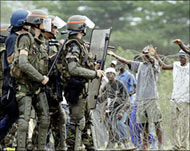UN demands end to Ivory Coast unrest
The UN Security Council has demanded the immediate end to the orchestrated violence in Ivory Coast primarily aimed at UN peacekeeping troops and warned that sanctions will be imposed against people blocking the peace process in the divided west African nation.

Kofi Annan, the UN secretary-general, echoed the demand, calling the situation in Ivory Coast critical and appealing to all parties to work together to calm the situation, restore peace and promote national reconciliation.
“We are trying to get the situation under control,” he said. “I think it is unfortunate that the population will be incited – incited to take to the streets to criticise the forces that are there to help the situation, the forces that are there to encourage them to make peace.”
The Security Council welcomed the efforts of Olusegun Obasanjo, the Nigerian president and chairman of the African Union, who flew to the Ivory Coast on Wednesday to try to end the violence.
Ivory Coast is still split between government and rebel-held zones despite peace deals to end a 2002-2003 civil war.
Outbreak
The unrest first erupted on Monday after a UN-backed international mediation group recommended that the expired mandate of Ivory Coast’s parliament not be renewed.
The parliament, filled with supporters of Laurent Gbagbo, the president, is viewed as his last bastion of power – and the president’s youthful supporters took to the streets in protest, targeting UN facilities.
At a formal meeting, the Security Council reiterated its full support for the International Working Group’s decision, and called on all Ivorian parties to cooperate with the group, the UN, and the international community in holding elections and implementing the road map to peace.
Philippe Djangone-Bi, Ivory Coast’s UN ambassador, welcomed the communique issued at the end of Obasanjo’s meeting with Gbagbo and Charles Konan Banny, the prime minister.
Background
It says the group does not have power to dissolve the National Assembly and asks Gbagbo and Banny to find a political solution until elections are held.
Gbagbo canceled planned October elections, blaming rebels who control the north of the country. Afterwards, the UN and the African Union endorsed a one-year extension of Gbagbo’s five-year mandate, despite fierce objections from rebels and the opposition.
 |
|
Young Patriots, supporters of |
The warring sides chose Banny to shepherd the country towards elections within a year. He named a new 32-member national unity government last month composed of rebel, opposition party and ruling party ministers.
On Tuesday, Gbagbo’s ruling Ivorian Popular Front said it was withdrawing from the peace process and would no longer cooperate with Banny’s government. It also demanded UN forces leave.
But Djangone-Bi said “the government and the president of the republic remain committed in the peace process”.
Priorities
What’s important now, he said, is cooperation between Gbagbo and Banny, who jointly asked demonstrators to leave the streets, and Banny’s mandate to oversee disarmament, reunification of the country, establish the electoral rolls and organise fair and transparent elections.
|
“At this point, we don’t see a need to increase the UN forces” John Bolton, |
The presidential statement adopted by the Security Council is likely to be followed by a resolution. France circulated a draft backing Annan’s request to add 4000 troops to the UN peacekeeping force in Ivory Coast which has about 7000 military and 660 international police.
But John Bolton, the US ambassador to the UN, said on Thursday: “At this point, we don’t see a need to increase the UN forces.”
He said the US wants to focus on the underlying problems that lead to peacekeeping missions “and not simply be reacting minute-by-minute to events on the ground”.
Annan countered that the recent events in Ivory Coast “made our case” for adding troops.
Presidential statement
Asked about the US strategy, Annan said “ideally, you would want to resolve all of these things politically … but sometimes you will have to put in the troops to get to the peace that you’re trying to achieve – and this is … the situation we are in Ivory Coast.”
“It’s very easy to criticise and say these things, but it’s not that simple, if I may say,” Annan added.
In the presidential statement, the Security Council strongly condemned the violent and orchestrated attacks in the capital, Abidjan, and western cities by street militias and other groups associated with the pro-Gbagbo Young Patriots, “as well as their instigators”.
“The Security Council regards these particularly serious and unacceptable incidents as endangering the process of national reconciliation,” the council said.
“It calls upon all Ivorians to refrain from any hostile action and demands the immediate end of this violence and of all hatred messages in the media, in particular the attacks against the United Nations,” the statement said.
Denials and support
Djangone-Bi, the Ivory Coast ambassador, denied the protests were orchestrated and said “patriots of all ages, of all political parties and civil society” took part.
The council strongly backed prime minister Banny and asked the UN peacekeeping force to provide him with “all necessary support”.
It stressed that “targeted measures” – code for sanctions – will be imposed on people blocking the peace process, including by attacking UN or French forces. But after more than a year, the council has yet to come up with a list of names of people that would be subject to a travel ban and asset freeze.
Jean-Marie Guehenno, the undersecretary-general for peacekeeping, who briefed the council, said the violence and hate messages, particularly against the UN, were “really very dangerous in what is really a very fragile peace process”.